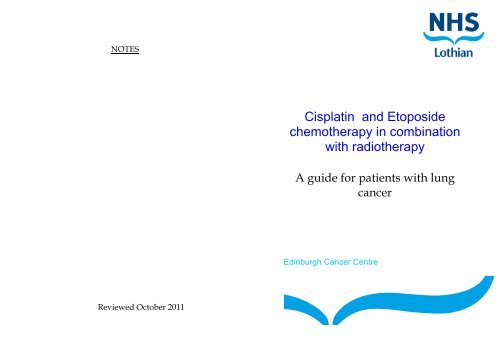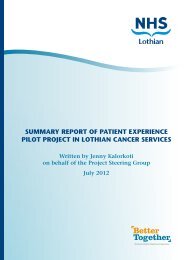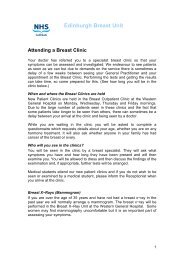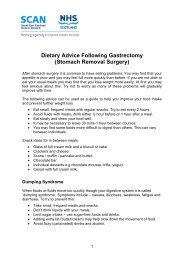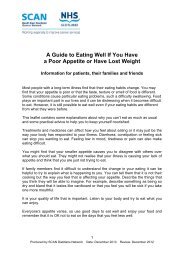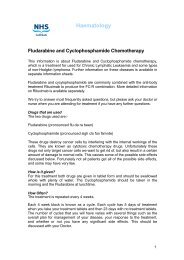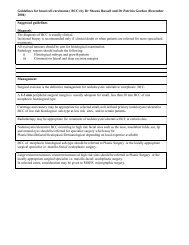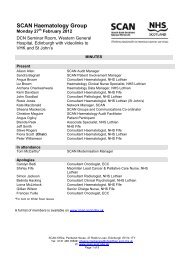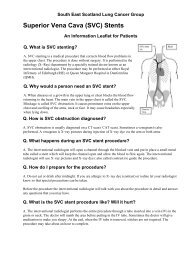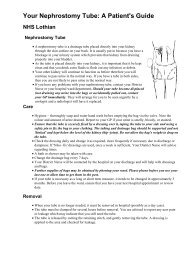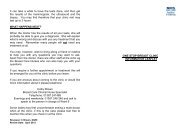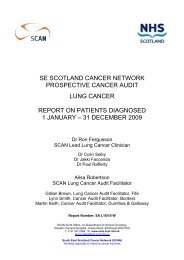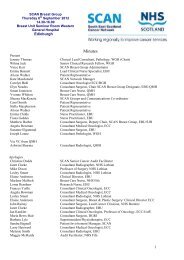Cisplatin and Etoposide chemotherapy in combination with ... - SCAN
Cisplatin and Etoposide chemotherapy in combination with ... - SCAN
Cisplatin and Etoposide chemotherapy in combination with ... - SCAN
You also want an ePaper? Increase the reach of your titles
YUMPU automatically turns print PDFs into web optimized ePapers that Google loves.
NOTES<br />
<strong>Cisplat<strong>in</strong></strong> <strong>and</strong> <strong>Etoposide</strong><br />
<strong>chemotherapy</strong> <strong>in</strong> comb<strong>in</strong>ation<br />
<strong>with</strong> radiotherapy<br />
A guide for patients <strong>with</strong> lung<br />
cancer<br />
Ed<strong>in</strong>burgh Cancer Centre<br />
Reviewed October 2011
5 2<br />
Some people also require to be fed temporarily<br />
through a tube as an <strong>in</strong>-patient. Most cases do not<br />
need this <strong>and</strong> we can treat you as an out-patient. The<br />
pa<strong>in</strong> on swallow<strong>in</strong>g can last a few weeks after the end<br />
of radiotherapy. Very occasionally radiotherapy can<br />
cause a long term scarr<strong>in</strong>g of the oesophagus, which<br />
needs to be <strong>in</strong>termittently stretched.<br />
• Inflammation of the lungs (pneumonitis) – this<br />
can occur from 1-3 months after you f<strong>in</strong>ish your<br />
radiotherapy. You might notice that you become more<br />
short of breath <strong>and</strong>/or develop a cough. About 1 <strong>in</strong> 5<br />
people receiv<strong>in</strong>g radical radiotherapy for lung cancer<br />
need a course of steroids for this, about 1 <strong>in</strong> 20 need<br />
oxygen for a time <strong>and</strong> about 1 <strong>in</strong> 100 people can die<br />
from this.<br />
• Long-term scarr<strong>in</strong>g of the lungs – over many<br />
years the radiotherapy can cause fibrosis or scarr<strong>in</strong>g of<br />
the lungs. This is why we check your breath<strong>in</strong>g tests<br />
before we recommend radical radiotherapy. Follow<strong>in</strong>g<br />
radiotherapy you may notice that your breath<strong>in</strong>g<br />
gradually becomes a little worse. This is one of several<br />
reasons why we recommend you stop smok<strong>in</strong>g.<br />
How the treatments are given<br />
The description <strong>in</strong> the table is the general scheme but due to<br />
difficulties <strong>in</strong> co-ord<strong>in</strong>at<strong>in</strong>g the treatment your personal<br />
schedule may not be exactly the same. Your radiotherapy starts<br />
usually starts at the beg<strong>in</strong>n<strong>in</strong>g of your 2nd cycle of<br />
<strong>chemotherapy</strong> <strong>and</strong> cont<strong>in</strong>ues until 1 week after your 3 rd .<br />
2. Nausea <strong>and</strong> vomit<strong>in</strong>g – this can be a common<br />
problem <strong>with</strong> this <strong>chemotherapy</strong>. We will give you antisickness<br />
tablets to take whilst receiv<strong>in</strong>g your<br />
<strong>chemotherapy</strong> <strong>and</strong> for a few days afterwards to try <strong>and</strong><br />
help combat this. It is very important that you dr<strong>in</strong>k<br />
plenty <strong>in</strong> the days follow<strong>in</strong>g your <strong>chemotherapy</strong>. If<br />
you cannot do this you should let us know.<br />
3. Effects on your blood mak<strong>in</strong>g cells – all<br />
<strong>chemotherapy</strong> can have effects on your bone-marrow.<br />
This can make you more prone to:<br />
• Anaemia - you may require blood transfusions<br />
• Bleed<strong>in</strong>g or bruis<strong>in</strong>g - due to fewer platelets<br />
(the cells that make your blood clot). You may<br />
require a platelet transfusion for this.<br />
• Infections – due to a reduction of white blood<br />
cells (<strong>in</strong>fection fight<strong>in</strong>g cells). Infections can<br />
be potentially life threaten<strong>in</strong>g so it is important<br />
to seek medical advice immediately if you feel<br />
unwell.<br />
If your temperature goes above 38°C (100.5°F) or if you<br />
suddenly feel unwell, even <strong>with</strong> a normal temperature,<br />
contact your doctor or the hospital straight away.<br />
Your <strong>chemotherapy</strong> nurse will give you written<br />
<strong>in</strong>formation regard<strong>in</strong>g what to do if these problems<br />
arise.<br />
4. Hair loss – this starts about 3 weeks after the first<br />
dose of <strong>chemotherapy</strong> <strong>and</strong> starts to re-grow about a<br />
month after the last dose. You will be given advice on<br />
obta<strong>in</strong><strong>in</strong>g a wig.<br />
5. Mouth Ulcers – Some patients compla<strong>in</strong> of mouth<br />
ulcers dur<strong>in</strong>g <strong>chemotherapy</strong>. We will give you<br />
mouthwashes to try <strong>and</strong> prevent this. Some patients also<br />
compla<strong>in</strong> of a metallic taste <strong>in</strong> their mouths.
3 4<br />
6. Hear<strong>in</strong>g loss <strong>and</strong> t<strong>in</strong>nitus (r<strong>in</strong>g<strong>in</strong>g <strong>in</strong> the<br />
ears) – please let us know if you experience this<br />
problem dur<strong>in</strong>g your treatment <strong>and</strong> we will adjust the<br />
dose of <strong>chemotherapy</strong>.<br />
7. Numbness <strong>and</strong> t<strong>in</strong>gl<strong>in</strong>g <strong>in</strong> h<strong>and</strong>s <strong>and</strong> feet –<br />
Please let us know if you experience this <strong>and</strong> we can<br />
adjust the dose of <strong>chemotherapy</strong>.<br />
8. Kidney damage – <strong>Cisplat<strong>in</strong></strong> can put a stra<strong>in</strong> on your<br />
kidneys. We check your kidney function <strong>with</strong> a blood<br />
test every cycle <strong>and</strong> give lots of fluids to flush the drug<br />
through your system. This is the reason we ask you to<br />
dr<strong>in</strong>k plenty of fluids when you get home.<br />
9. Effects on fertility – all <strong>chemotherapy</strong> can affect<br />
fertility <strong>and</strong> all patients should use contraception dur<strong>in</strong>g<br />
<strong>and</strong> for 1 year follow<strong>in</strong>g <strong>chemotherapy</strong>.<br />
Your radiotherapy<br />
1 st preparation visit<br />
You will receive radiotherapy treatment usually <strong>with</strong> your 2nd<br />
<strong>and</strong> 3 rd cycles of <strong>chemotherapy</strong>. The radiotherapy plann<strong>in</strong>g<br />
starts <strong>with</strong> a CT scan of your chest. You will have a scan<br />
performed on the special radiotherapy CT-scanner <strong>in</strong> the<br />
oncology department. This scan is performed <strong>with</strong> your arms<br />
above your head, hold<strong>in</strong>g onto a bar. Once the scan is complete<br />
the radiographers will make marks on your chest as reference<br />
po<strong>in</strong>ts. The centre of these marks will be made permanent <strong>with</strong><br />
a t<strong>in</strong>y tattoo. This is made <strong>with</strong> a small p<strong>in</strong>prick.<br />
The data from this scan is then moved to our plann<strong>in</strong>g<br />
computer <strong>and</strong> the oncologist def<strong>in</strong>es the area that should<br />
receive the radiotherapy. The radiotherapy planners then design<br />
your treatment us<strong>in</strong>g a series of fields or beams, which all meet<br />
at the area of your cancer.<br />
2 nd preparation visit<br />
Once the treatment is designed you will come back to the CT<br />
scanner. Here we check that everyth<strong>in</strong>g fits <strong>and</strong> make some<br />
more marks on your chest. Your radiotherapy treatment may<br />
start the same day or a few days later.<br />
Treatment<br />
Your radiotherapy treatment consists of 20 daily visits,<br />
Monday to Friday, over 4 weeks. Radiotherapy is pa<strong>in</strong>less<br />
<strong>and</strong> each treatment takes about 10 m<strong>in</strong>utes to deliver, though<br />
your trip to the department may take about an hour, as delays<br />
often occur.<br />
Side-effects of radiotherapy:<br />
• Like <strong>chemotherapy</strong>, radiotherapy causes tiredness.<br />
• Pa<strong>in</strong> on swallow<strong>in</strong>g (oesophagitis) – the<br />
comb<strong>in</strong>ation of radiotherapy <strong>and</strong> <strong>chemotherapy</strong> gives a<br />
higher chance of develop<strong>in</strong>g swallow<strong>in</strong>g problems <strong>and</strong><br />
heartburn (oesophagitis). This is due to <strong>in</strong>flammation<br />
of the gullet (oesophagus). This can start about 3<br />
weeks <strong>in</strong>to the course of radiotherapy, when you may<br />
notice discomfort as you try to swallow food <strong>and</strong>/or<br />
dr<strong>in</strong>ks. If you develop this we recommend you eat<br />
softer foods such as m<strong>in</strong>ced beef, mashed potatoes,<br />
soups etc <strong>and</strong> avoid very hot or cold dr<strong>in</strong>ks. Many<br />
patients need to take strong pa<strong>in</strong>killers dur<strong>in</strong>g this time<br />
such as liquid Morph<strong>in</strong>e. We also give you an antacid<br />
<strong>and</strong> a local anaesthetic to help <strong>with</strong> this side effect.<br />
Please let the radiographers / nurses know if you have<br />
developed this. Occasionally swallow<strong>in</strong>g becomes very<br />
difficult <strong>and</strong> some people require admission to hospital<br />
to help control symptoms.
1<br />
6<br />
Y<br />
our oncologist has recommended that you should<br />
receive both <strong>chemotherapy</strong> <strong>and</strong> radiotherapy to try <strong>and</strong><br />
cure your lung cancer. This <strong>in</strong>formation leaflet is<br />
designed to help you underst<strong>and</strong> more about the treatment.<br />
Your <strong>chemotherapy</strong><br />
This <strong>chemotherapy</strong> regime consists of 4 courses (cycles) of<br />
<strong>chemotherapy</strong> <strong>with</strong> radiotherapy usually delivered <strong>with</strong> the<br />
2 nd <strong>and</strong> 3 rd cycles. The 4 th cycle of <strong>chemotherapy</strong> starts when<br />
your radiotherapy has f<strong>in</strong>ished. A ‘cycle’ of <strong>chemotherapy</strong> lasts<br />
3 weeks (days 1-21). The <strong>chemotherapy</strong> is given as an outpatient<br />
<strong>in</strong> Ward 1 at the Ed<strong>in</strong>burgh Cancer Centre.<br />
The <strong>chemotherapy</strong> consists of 2 drugs, <strong>Cisplat<strong>in</strong></strong> <strong>and</strong><br />
<strong>Etoposide</strong>.<br />
<strong>Cisplat<strong>in</strong></strong> is adm<strong>in</strong>istered on the 1 st day of each treatment cycle<br />
<strong>and</strong> is given over 2 hours <strong>with</strong> a bag of fluid <strong>in</strong>to a cannula <strong>in</strong><br />
your arm. You will be connected to a drip for a few hours<br />
before receiv<strong>in</strong>g the <strong>Cisplat<strong>in</strong></strong>.<br />
<strong>Etoposide</strong> is given on days 1, 2 <strong>and</strong> 3 of each cycle, aga<strong>in</strong> as a<br />
drip <strong>in</strong>to your arm. This is given over 2 hours.<br />
This <strong>chemotherapy</strong> is usually well tolerated but like all cancer<br />
treatments can have some side-effects.<br />
Side effects of <strong>chemotherapy</strong><br />
1. Tiredness - all cancer treatments can make you quite<br />
fatigued. We will give you advice on how best to deal<br />
<strong>with</strong> this.<br />
Concurrent chemo-radiation<br />
Cycle 1 Cycle 2 Cycle 3 Cycle 4<br />
<strong>Cisplat<strong>in</strong></strong> & <strong>Etoposide</strong><br />
1<br />
<strong>Etoposide</strong><br />
<strong>Etoposide</strong><br />
<strong>Cisplat<strong>in</strong></strong> & <strong>Etoposide</strong><br />
<strong>Etoposide</strong><br />
<strong>Etoposide</strong><br />
<strong>Etoposide</strong><br />
<strong>Cisplat<strong>in</strong></strong> & <strong>Etoposide</strong><br />
week 1 week 4 week 7 week 10<br />
50Gy <strong>in</strong> 20 fractions<br />
4 Weeks<br />
You will be assessed before each <strong>chemotherapy</strong> treatment,<br />
<strong>and</strong> assessed by a nurse weekly dur<strong>in</strong>g radiotherapy. Once<br />
completed, your lung cancer nurse will phone you weekly prior<br />
to be<strong>in</strong>g seen at the cl<strong>in</strong>ic 4-6 weeks after complet<strong>in</strong>g your<br />
treatment. This is to check that you are recover<strong>in</strong>g from the side<br />
effects of your treatment. You will then be seen 3-4 months<br />
later <strong>with</strong> a CT scan of your chest to assess the response to<br />
treatment.<br />
<strong>Etoposide</strong><br />
<strong>Cisplat<strong>in</strong></strong> & <strong>Etoposide</strong><br />
<strong>Etoposide</strong><br />
2 3 1 2 3 1 2 3 1 2 3<br />
<strong>Etoposide</strong><br />
12 weeks


